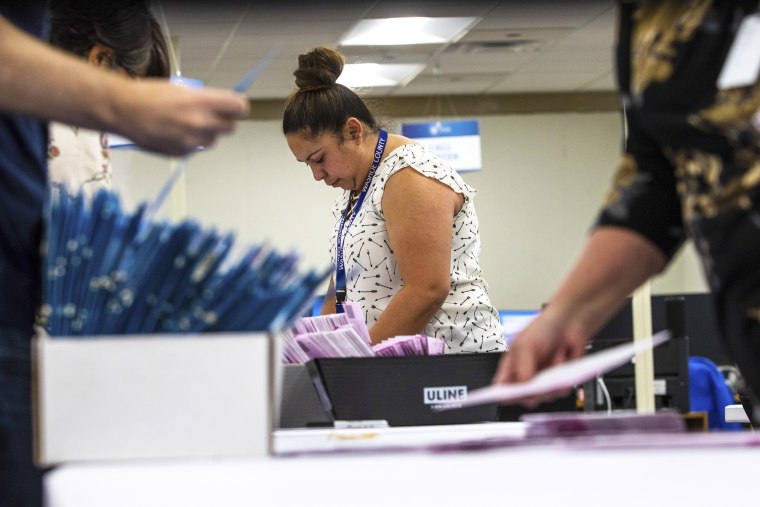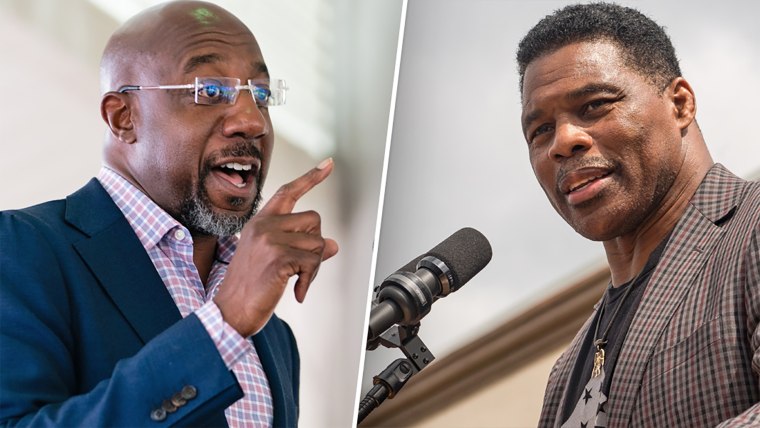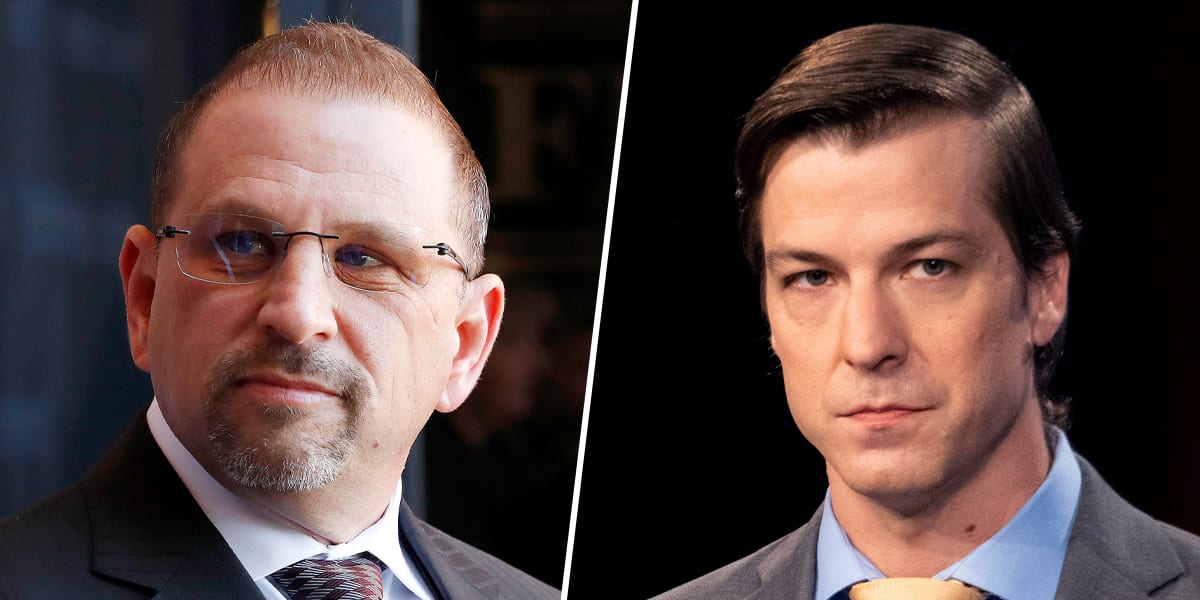ATLANTA — Libertarian Chase Oliver might determine which party takes control of the Senate. But not by winning his election.
The long-shot candidate for Georgia’s high-stakes Senate race could force a Dec. 6 runoff between Democratic Sen. Raphael Warnock and Republican challenger Herschel Walker, reshaping the dynamics of an already close contest and possibly leading to yet another scenario where all eyes focus on Georgia with the Senate majority on the line.
“I want the voters to know that they do have a third choice in this election,” Oliver said in a debate here on Sunday, which Warnock attended and Walker skipped. “I don’t have any interest in partisan bickering. I owe no allegiance to either party. I only owe allegiance to you, the voter.”
If Oliver’s plea for voters to “send a message” to the two-party system gathers even a percentage point or two, it may deny Walker or Warnock the 50% required by state law to win on the first ballot.
He’s not the only third party candidate positioned to make a small splash with potentially huge consequences in the 2022 midterm elections. Other outside candidates in states like Arizona, Nevada and Pennsylvania are emerging as wildcards — with polls indicating they have nowhere near enough support to win, but more than enough to influence results in tight races that can make or break President Joe Biden’s agenda for the next two years.
“I think it’s going to be significant,” Chuck Coughlin, an Arizona Republican pollster, said of the third-party impact on key Senate races. “After all the ballots are counted, [candidates] are going to say, ‘That guy had 5% of the vote or 4% of the vote, and if I add that 4%, I win,’ because that’s how close these races are going to be.”
“When all the shouting and hollering is done, and all the ballots get counted, people are going to look around and go: ‘God, we’ve got to keep that guy out of the race in the future,’” he added. “‘We’ve got to do something to stop that from happening.’”

As was the case in Georgia, the Libertarian candidate on the ballot in Arizona, Marc Victor, was allowed to participate in a Senate debate — something pollsters and forecasters told NBC News was critical for a third-party candidate to garner more support.
“It’s a significant difference, in that it’s not going to propel the third-party candidate to victory, but it definitely impacts the conversation,” said Spencer Kimball, director of polling at Emerson College in Massachusetts. “Because now instead of it being a one-on-one debate, it becomes a two-on-one debate in certain situations.”
Standing onstage next to Republican nominee Blake Masters earlier this month, Victor excoriated both parties during Arizona’s lone general election Senate debate this cycle. He said of Sen. Mark Kelly, D-Ariz., and Masters: “One of them kisses Biden’s ring, one of them kisses Trump’s ring. I don’t kiss anybody’s ring.”
“Live your life however you choose. Just let other people do the same thing,” said Victor, a combat veteran. “My name is Marc J. Victor. And if you’re tired of the same old politics, I’m your guy.”
But while Victor was seeking to siphon voters from both candidates, some of his sharpest criticisms were reserved for Masters. After an answer in which Masters danced around whether Biden won the 2020 presidential election, Victor responded: “Boy, for a guy who’s never been elected before, he sure sounds like a politician to me.”
Pollsters said as far as Libertarians go, they traditionally tend to win over more Republican-leaning voters than those who would back Democrats, though other third-party candidates, such as Green Party nominees, have the inverse effect.
Angela McArdle, the chair of the Libertarian National Committee, said it’s not her party’s job to protect Republican candidates who are alienating voters.
“If Republicans fear that Libertarians are going to be spoilers, Republicans need to run more liberty-minded candidates,” McArdle told NBC News. “Chase Oliver and Marc Victor both performed well in their respective debates. They’ve earned any votes they receive, and Republicans are not entitled to anyone’s vote.”
With the rare exception of independent Evan McMullin in Utah, who has an outside chance of victory in November after Democrats didn’t field a candidate, the influence of most third-party Senate hopefuls this cycle is limited to picking off a few points.
But surveys suggest even a few points could be pivotal. On Thursday, an Insider Advantage/Fox 29 Philadelphia poll of Pennsylvania voters found Democrat John Fetterman locked in a dead heat with Republican Mehmet Oz. That survey, with a margin of error of plus or minus 4.2 points, also showed Libertarian Erik Gerhardt at about 2% and “someone else” garnering about 1.5% support. Five candidates will appear on the Senate ballot.
Dave Paleologos, director of the Suffolk University Political Research Center, said the third-party candidates in Pennsylvania may prove more useful for Fetterman than Oz, as some conservative voters who may otherwise “hold their nose and vote for Oz,” who has a low favorable rating, may opt to pick a third-party nominee.
“Because there are five candidates on the ballot, you could have people who may not, for whatever reason, feel Fetterman is their choice but who don’t like Oz, who has a favorability problem, [and look at the] three other options for Pennsylvania voters,” he said. “And I think that’s going to impact the outcome and potentially the margin in Pennsylvania.”
In Georgia, a Landmark Communications survey released this week found Warnock and Walker in a dead heat while Oliver drew the backing of 3.4% of respondents. And an Insider Advantage/Fox 5 Atlanta poll published this week showed Warnock with a 2 point edge while Oliver received 4% of the vote. Both survey results fell within the margin of error, and no candidate cleared 50%.

“In Georgia it obviously matters because you have to get to 50%,” said Jessica Taylor, the Senate and Governors editor for the nonpartisan Cook Political Report. “And if another candidate is pulling a significant amount from either side, or any number really, it just makes that 50%+1 math harder.”
“The most probable outcome is this will go to a runoff,” she added. “So the big question is: Is it déjà vu again and the entire Senate majority comes down to Georgia?”
Polling in the aforementioned states echoed Arizona, where an Arizona Family/HighGround survey — a poll conducted by Coughlin’s firm — found Kelly up about 3 points, within the margin of error, while Victor drew support from more than 5% of voters.
And in Nevada, where the ballot lists Democratic Sen. Catherine Cortez Masto, Republican Adam Laxalt, three third-party hopefuls and a line for “none of these candidates,” recent surveys have shown the combined share backing “someone else” and none of the above to be greater than the margin separating the two major contenders.
The “none of these candidates” option “actually has decided races before,” Taylor said, observing that even though it’s unclear which of the two candidates would benefit more from the extra options, “that race is just very close.”
Much attention has been paid to the level of support third-party candidates can wrestle from the major party contenders in recent election cycles, particularly on the presidential level. But, as Kimball noted, these candidates can often appear stronger in polling than what their final performance shows as voters often decide to go with either the Democratic or Republican nominee.
“We have to wait to see the melt on these third-party candidates,” he said. “We’ll see if anybody can hold 3 or 4 points or if they’re going to get down to under a decimal.”
Source: | This article originally belongs to Nbcnews.com










